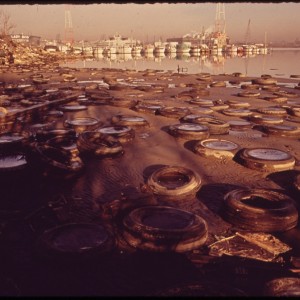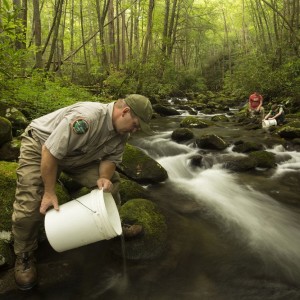
By Codi Kozacek
Circle of Blue
Mercury in the water can accumulate to dangerous levels in fish, making them unsafe to eat. When the Clean Water Act was introduced, mercury was used in a host of products, including batteries, and most pollution came when these products were thrown away and burned, or when factories and mines released mercury through wastewater discharges. Regulations on those activities cut mercury emissions in half by the 1990s, according to Dave Krabbenhoft, a research hydrologist at the U.S. Geological Survey. Now, most mercury ends up in lakes and rivers by falling from the air after being emitted by coal-fired power plants.
“Mercury gets up into the atmosphere and can contaminate fish in fairly remote lakes,” Mark Brigham, a hydrologist at the USGS, told Circle of Blue. “There’s a whole host of ecological and chemical factors that conspire to make mercury more of a problem in some water bodies and not in other water bodies. The amount of wetlands, the pH in a water body, for example, can have a large effect. Also, other pollutants like sulfates in wetlands can stimulate methylmercury production.
“That’s why it’s a broad-scale problem,” Brigham said. “It’s not something you can fix by finding out where the ends of pipes are.”
Some remaining mercury contamination may be largely outside of U.S. control. Many domestic sources have already been addressed, and new regulations on coal-fired power plants could cut U.S. mercury emissions even further. Mercury, however, can travel long distances in the atmosphere, making other country’s emissions a concern.
“Within the U.S. and Canada, we’ve done a pretty good job controlling emissions and we continue to clean up our act,” said Brigham of the USGS. “At the same time we do that, Asia and India are rapidly industrializing, rapidly building new coal-powered plants. That may explain why in some regions we’re not getting as rapid of a decline as we had hoped.”
A news correspondent for Circle of Blue based out of Hawaii. She writes The Stream, Circle of Blue’s daily digest of international water news trends. Her interests include food security, ecology and the Great Lakes.
Contact Codi Kozacek





